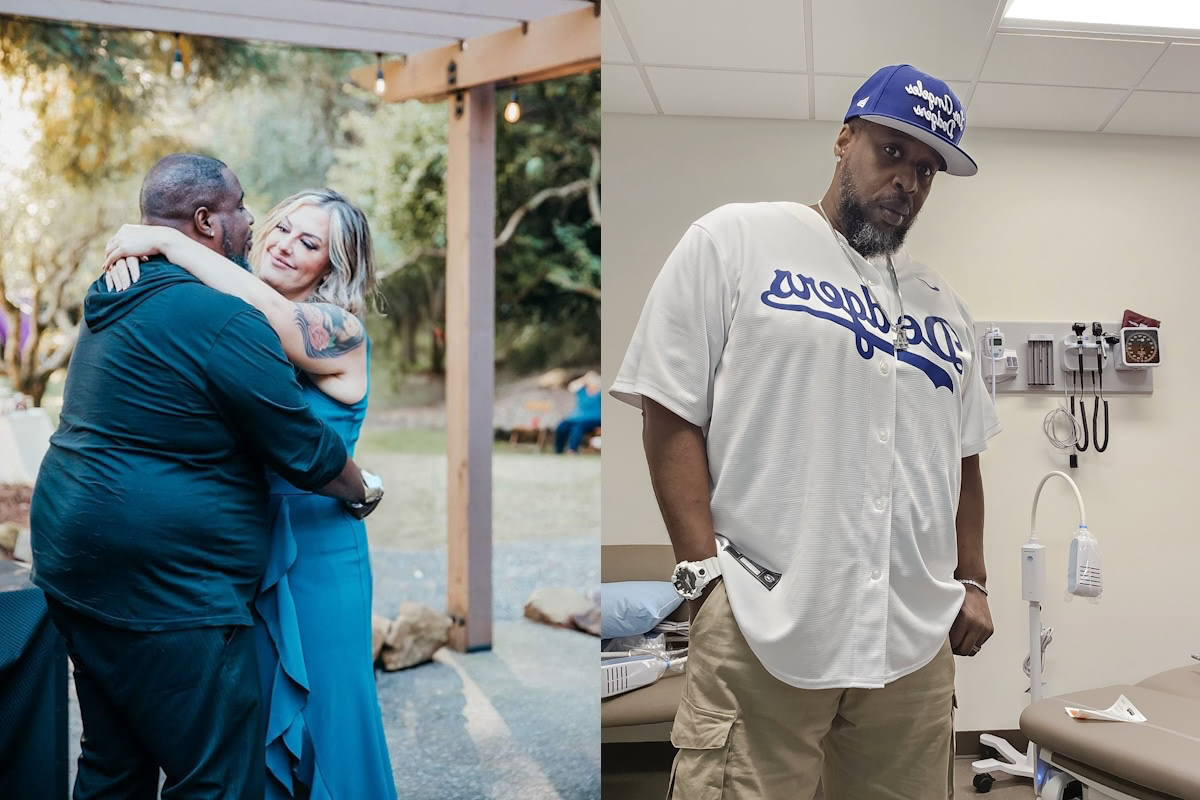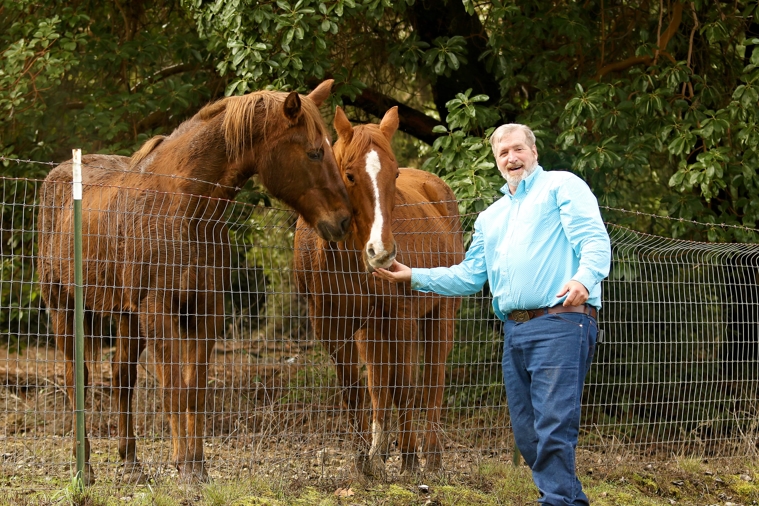A Life Reset
Weight-loss surgery adds zest for life
Apr 30, 2024

Affectionately dubbed “Pops” and “OG Pop-Pops” by his kids and grandkids, Erik Taylor really is the life of the party. He jokes with family at get-togethers, chats with co-workers at his clinic job, cheers teams at sporting events, jams with bands at concerts and rallies talent at nonprofit community events.
But not long ago, the activities that energized Erik started to tax him. The excess pounds he carried crept up while his vitality slumped. His knees hurt, and his blood pressure soared. He struggled for stamina during the day and battled sleep problems at night. His doctor declared him clinically morbidly obese.
One day, stepping on the scale at 315 pounds, Erik decided to double down like never before on a big health goal: “I needed to become a smaller person,” he says.
Preparing for weight-loss surgery pays
From the get-go, Erik assumed he’d need medical help to make a lasting change. No stranger to the frustrating cycle of weight gain and loss, he’d already tried many options without success.
“I knew I had to get more fit, which meant extreme weight loss and a change of my eating habits,” he says. “Controlling that is something I’ve proven to myself over the years that I need some assistance with.”
A couple of key people in Erik’s inner circle — his partner and his brother — had experienced positive results from weight-loss surgery several years prior, and they prompted Erik to look into it for himself.
“When they mentioned the surgeon at Adventist Health Portland, I did some research,” he explains. “Every single thing I read about Dr. Stucke and his staff was stellar.”
Bariatric surgeon Ryland Stucke, MD, explained to Erik what to expect before, during and after the procedure. “When I met him, any little doubt or fear I had, which was minimal, went all the way down to zero,” Erik says. ‘I was like, ‘This is the guy for me.’”
Gastric bypass, as it’s called, separates the stomach into two sections. The surgeon connects the small intestine to the upper part of the stomach. Food skips — or “bypasses” — the lower part of the stomach, causing the body to absorb fewer calories. This leads to weight loss over time.
This bypass also leads to changes in the nutrients the body absorbs. Dr. Stucke told Erik he would need to monitor his diet closely after surgery and into the future. Dr. Stucke also explained that Erik had to change his lifestyle and eating habits in the weeks leading to surgery. This included switching to a liquid diet for a while.
Erik says those last few days tested his willpower because they fell right near the peak of the December holiday treat season. “My promise to myself was that I wasn’t going to do anything to complicate the surgery so I could have the best outcome afterwards,” he recalls.
So, while family and friends feasted on festive sweets, Erik stuck to the plan, sipped protein shakes and focused on the path ahead. That preparation, it turns out, paid off.
Easier than expected
On surgery day, Erik’s partner drove him to Adventist Health Portland. Dr. Stucke performed a smooth and successful operation, and Erik spent one uneventful night in the hospital. The nursing staff tended to his comfort, kept tabs on his vitals and helped him walk around every few hours.
“The following day, I went home, and I just started sticking to the program,” he recalls. “That’s what I’ve been doing ever since. Honestly, it was easier than I expected. Thanks to Dr. Stucke and his team, I had gotten mentally prepared to do what needed to be done.”
‘My reset on life’
Nearly three months down the road, Erik stepped on the scale and was thrilled to find he was 50 pounds lighter than before surgery. His clothes fit looser. His knees hurt less. His oomph returned, and he now moves with ease.
“I feel great,” he says. “Whether it’s playing sports or hiking or just going for really long walks, those are things I’m finding a lot easier to do. Dr. Stucke cleared me to get back into the gym so I wouldn’t be losing muscle. Now I’m back doing strength training, and I get a lot of energy and confidence off of doing that. It’s awesome to get the competitive edge back that I used to have when I was in better shape.”
Even Erik’s blood pressure continues to slowly improve. He hopes one day to be able to scale back his medicine or stop it altogether.
Where junk food used to rule his palate, Erik now prefers meat like chicken and ground turkey and leafy greens like spinach, broccoli and cabbage. He feels fuller faster, and he’s learning to listen to his body and stop eating before reaching a saturation. That’s not always easy, he admits, but he has learned to enjoy treats in smaller portions that yield bigger rewards.
“At my follow-up appointment with Dr. Stucke a few weeks after my operation, I just thanked him,” Erik says. “To be frank, he gave me new lease on life, along with his staff and everybody else I worked with. Sure, that’s what he gets paid to do, but he really did a great job. He was personable. And he was honest with me about what my expectations should be. That’s what I need: Just shoot it straight with me.”
Besides feeling and looking leaner, Erik also lends a brighter example to his family, showing them how valuable it is to prioritize health. He brings added verve to his role as a volunteer stage manager at the community-boosting nonprofit Good in the ‘Hood. And at the medical clinic where he works, he shares renewed energy with everyone he interacts with.
“Carrying around less of myself makes being at work a little easier now,” he says. “One of my coworkers asked me the other day, ‘Why are you running up the stairs?’ and I was like, ‘Because it feels good!’ It’s really what I call my reset on life.”
A better life with bariatric surgery
To those considering weight-loss surgery, Erik shares this advice: “Be honest with yourself. Think about how this could affect your health. Don’t think about anybody else. Put you first. A lot of people think, ‘Oh, I don’t want to be selfish or make it all about me.’ But in this instance, it really is all about you and whether your quality of life could be better.”
Maybe you want to enjoy long walks again, or run another 5K, or just be more active with friends and family. Whatever your motivation, Erik says weight-loss surgery is well worth considering.
“If you’ve tried working out, tried all those diets and you’ve taken a serious look at your nutrition and made changes and you still can’t get the results you’re looking for,” he says, “this is absolutely 100% something you need to try to potentially do for your life.”
Are you a candidate for bariatric surgery?
If you've struggled to lose weight and keep it off, bariatric surgery may be an option. Find out if you're a candidate for bariatric surgery by taking our free assessment.


